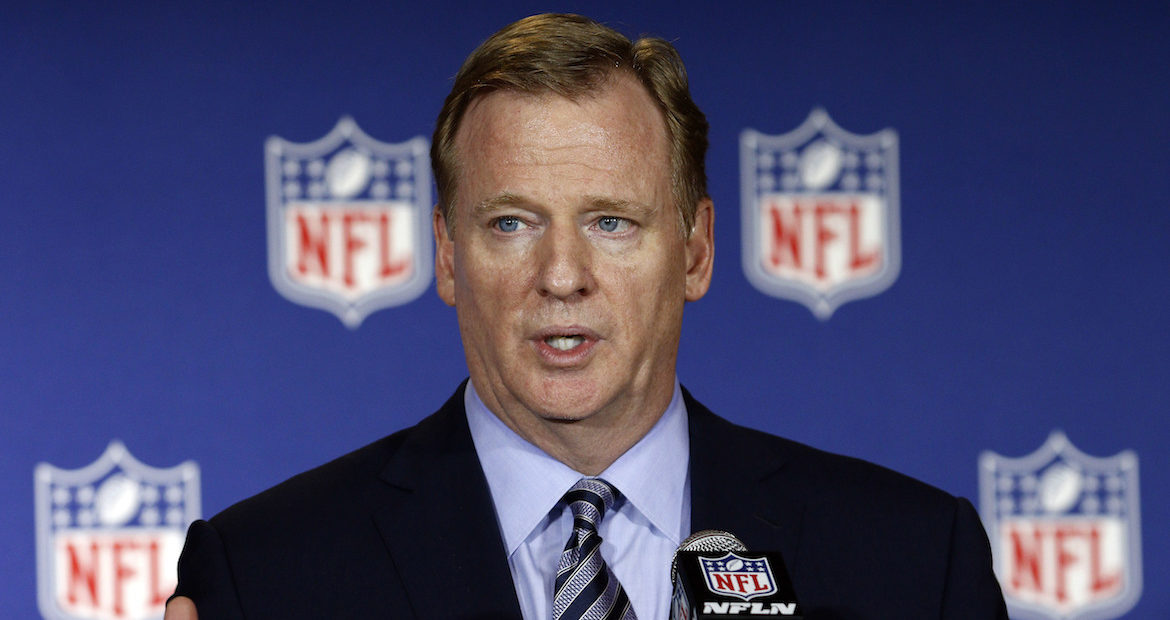
With Ezekiel Elliott Ruling, Roger Goodell Finally Gets Domestic Violence Policy Right
It took a while to start this column. After all, the NFL had to have mucked something up in the case of Ezekiel Elliott and his six-game suspension. It had to have bungled the length, the investigation’s thoroughness or the public explanation of its findings just as it had in the cases of Ray Rice, Greg Hardy and Josh Brown. But it didn’t. The NFL got it right.
It was almost three years ago, December 10th, 2014, when Roger Goodell announced the league’s new personal conduct policy, headlined by a baseline suspension of six games without pay for violations involving assault, battery, domestic violence or sexual assault. That policy was finally and fully enacted today.
Most domestic violations accusations not caught on video or that don’t come with an admission of guilt are rooted in he said-she said. By no means is it 100% clear that Elliott is guilty. But the NFL, in its letter to the 22-year old rusher, presented a case so compelling, so rooted with testimony and expert evaluation that the commissioner was right to doll out those six games.
The league presented a detailed breakdown of how they reached their conclusion, starting with interviews of a dozen witness and experts, including the accuser, Tiffany Thompson and Elliott. In addition, it parsed through photographic evidence (presumably Ms. Thompson’s bruises) and thousands of text messages. It brought in medical experts who were consulted “regarding identification, causation and aging of certain injuries to Ms. Thompson.”
In other words, its forensic evidence was strong enough to refute Elliott’s counter argument that Thompson’s bruises were preexisting.
There were revelatory aspects of he letter as well such as the league pointing to three separate incidents in one week of last July, each broken down by the varying parts of Thompson’s body that were injured, and supported by text messages.
The letter even accounts for Elliott’s other counterargument – that Thompson is not credible. The NFL included a powerful counter from the Columbus prosecutor who investigated the case and stated, “we never concluded that she was lying to us.” This, by the way, illustrates exactly why there is a role for these quasi-judicial NFL investigations.
The airtight report as presented makes it difficult to argue with the league’s conclusion of “substantial and persuasive evidence supporting a finding that [Elliott] engaged in physical violence against Ms. Thompson on multiple occasions during the week of July 16, 2016.”
Of course Elliott will do just that. He immediately announced plans to appeal and like Deflategate, this case could very well be headed to court with questions of Goodell’s authority under Article 46 of the CBA back in the spotlight.
Elliott defenders from Jerry Jones to his actual paid defenders, his attorneys, are seething and disappointed. Patriots fans have already coalesced with Cowboys fans to form an even more robust Goodell hate club.
Blaming Goodell for everything wrong with the NFL is its own sport, and in many cases warranted. But in no way is the commissioner to blame for this. He finally launched a real independent investigation, one that exists outside of a legal system where those accused of domestic violence rarely see trial. Nor was this investigation conducted in a town where the accused is a superhero.
Moreover, what makes this policy finally feel like an actual policy are the six games. The league could have doled out two games like it did for Junior Galette who was accused of sexually assaulted a woman for years. Or one game like it did for Josh Brown who literally documented his abusive ways. The fine print of the policy allows a shorter or lengthier suspension for mitigating or aggravating circumstances. But for the policy be legitimate, to be a potential deterrent to future abusers and a comfort to the abused who often shy away from the legal system, six games is absolutely necessary if evidence points to wrongdoing. In the case of Elliott, it does.
Goodell hardly deserves a medal. Like many of his actions, today’s ruling may very well have been reactive after a series of miscues. But this is a huge step forward to a becoming a less tolerant and more consistent disciplinary body. If you want to blame someone, start and end with Elliott who seemingly attacked his girlfriend three times in one week last July.



